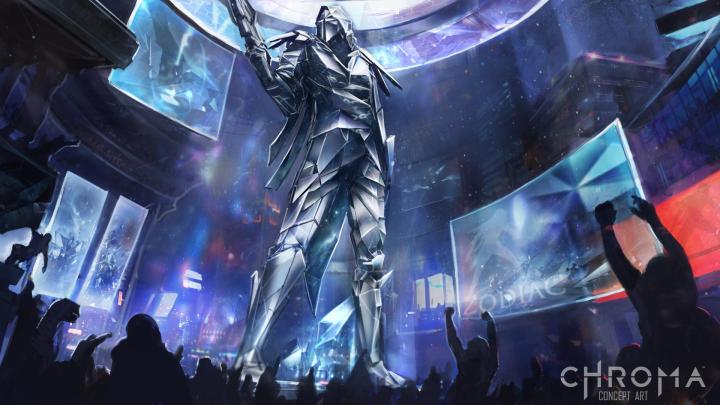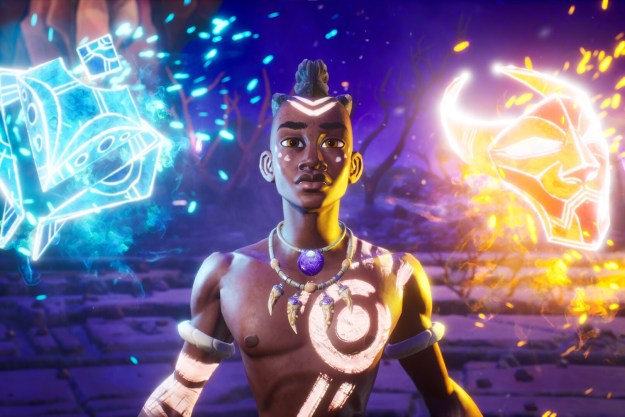
Chroma is a surprise. Who would have expected Harmonix, the studio behind Rock Band, to step up for a collaboration with Counter-Strike: Global Offensive dev Hidden Path Entertainment on a multiplayer arena shooter with rhythm-based weapons? Yes, this is the Rock Band maker’s next project. It’s not the only surprise though. It’s not even the biggest. Harmonix, as it turns out, is in the midst of a reinvention. Chroma is representative of a larger shift, one that promises to change the way the company does business in the years ahead.

“In large part, [Chroma is] driven by our appetite for creative risk,” Harmonix co-founder and CEO Alex Rigopulos tells Digital Trends. “If you want to do things that are different and unproven, there’s always a giant question mark about whether the marketplace will respond to your vision, whether they will buy the entertainment premise. If you have $10 million to spend making entertainment experiences, you can spend that $10 million on one experience and pray to god that the world actually wants it, or you could spend $1 million each on a first early manifestation of 10 different experiences, and give each of them an opportunity to become airborne and flourish in a live marketplace. Strategically, that’s the way we would like to be creatively adventurous, and give more of the crazy ideas we have an opportunity to take flight.”
It’s a marked shift away from the big team development mentality that fuels Harmonix’s biggest blockbuster franchises, Rock Band and Dance Central. Multi-million dollar investments with multi-year build times are an increasingly tough proposition when pint-size productions like Gone Home or disruptive business models like Wargaming’s free-to-play approach with World of Tanks generate lots of attention (and lots of income). Sure, the first Rock Band reached $1 billion in sales in the year after it launched, but times have changed. The rise of the indie and the democratization of game development via early access and crowdsourcing has shaken the AAA development space to its foundation. Chroma is both a reaction to that and a first step toward a new angle for Harmonix on the business of making video games.

“It’s bit of a flagship for a strategic transformation of the company, in that for most of our history we’ve been doing these big productions behind closed doors, building big games that we would then ship through partners into retail distribution and sell at premium price points. That form of game development is very cloistered and shielded from your ultimate audience,” Rigopulos explains. “Harmonix is in the process of reforming the studio towards one that works with very small teams taking smaller games to market much, much earlier in their development cycle, and then iterating and developing those games in live collaboration with an active marketplace of early adopters.”
In large part, [Chroma is] driven by our appetite for creative risk.
This doesn’t mean that the world will never see another Rock Band or Dance Central, but the industry is right now turning in a direction that makes developing games like those under the traditional “fire-and-forget” model more challenging. Think about why we don’t see Rock Band anymore. The audience dwindled, sure, but why? It was the high cost of entry coupled with the knowledge that a newer, better version would arrive a year or two later. Ultimately, consumers didn’t want to keep buying new boxes of plastic instruments when improved plastic instruments were always just around the corner. They were also completely snowed in by the abundance of games in the genre, some general, others more band-specific. The peripherals and the licensed music made Rock Band an expensive proposition, and the need to keep income flowing led to oversaturation. It had to be euthanized.
Harmonix is in a better position now, following the success of Dance Central and the time away from the expensive, ongoing investment that was Rock Band. What’s more, Chroma is something entirely different. It’s a free-to-play shooter. Sure, the game’s arsenal of weapons are built on rhythm-based mechanics, but it’s still a game that sits outside of the Cambridge, Mass. studio’s comfort zone. That’s where Hidden Path’s contributions come in, of course. It still doesn’t answer the question of why though. Why is Harmonix tackling a shooter of all things?

“The origin story actually goes all the way back to 2001 when I first played Rez, maybe the first game that anyone would maybe call a musical shooter,” Rigopulos says. “I was really inspired by that game. On the one hand, I felt it was tapping into something potentially powerful. On the other hand, I felt it was really just scratching at the surface of that idea, and we could potentially go much deeper with it.”
I think shooter enthusiasts are desperately hungry for something new.
This is where Hidden Path comes in. Rigopulos and his peers at Harmonix appreciated what the relatively young studio pulled off with Counter-Strike: Global Offensive. The online multiplayer variant that spawned originally as a mod for Valve’s beloved FPS Half-Life saw a commendable revival in Hidden Path’s 2012 release. The core of what made the original game so memorable was still there even as the new developer introduced smart changes of its own devising. There are added questions and concerns related to balancing between Chroma‘s multiple classes – a feature that CS:GO doesn’t have – but that’s been informed thus far by the musical influences stemming from Harmonix’s involvement.

“We approached the game design from both the shooter angle and the music angle,” Rigopulos explains. “From the shooter side, we look at all of the typical aspects of shooter gameplay; of course shooting, but also ammo management, traversal, etc., and think how can we link up those aspects of gameplay to something musical, to give them musical meaning. And from the musical side, we’re always thinking what are all the attributes of music that non-musicians can hear and understand, and how can we hook up those things to gameplay in a meaningful way.”
“One example of that is this notion of your team in a class-based game … being a band,” he continues. “In real life, a band has a set of players each of which has a highly specialized function that is very different from all of the other players’ functions, and is equally vital to the success of the band as an entity. We see a very direct mapping from that to a class-based shooter, where every class on a team has a highly differentiated role, each of which is crucial to the successful function of that team. That’s one of many music-to-shooter parallels that we’re exploring.”
Chroma is set to launch a closed alpha later this month; you can sign up for it now at PlayChroma.com. For more on where the game stands now, check out our hands-on preview.
Editors' Recommendations
- Now more than ever, we need Taylor Swift: Rock Band
- Fortnite Festival will leave you wishing for a real Rock Band revival


